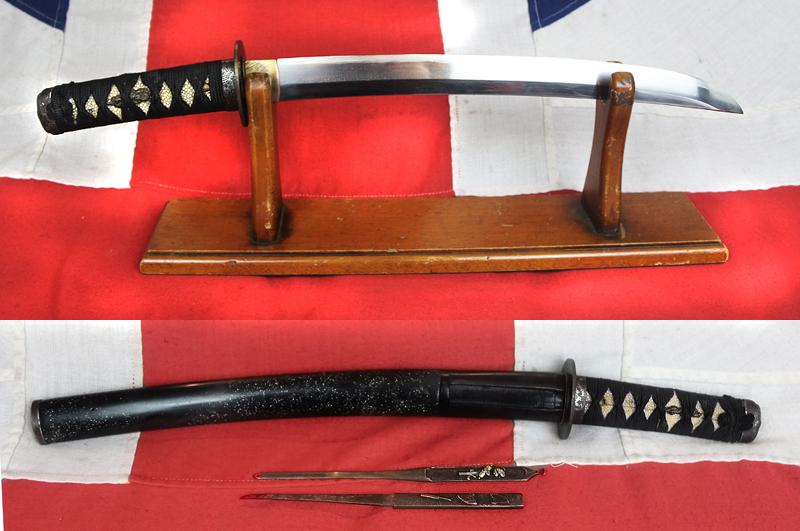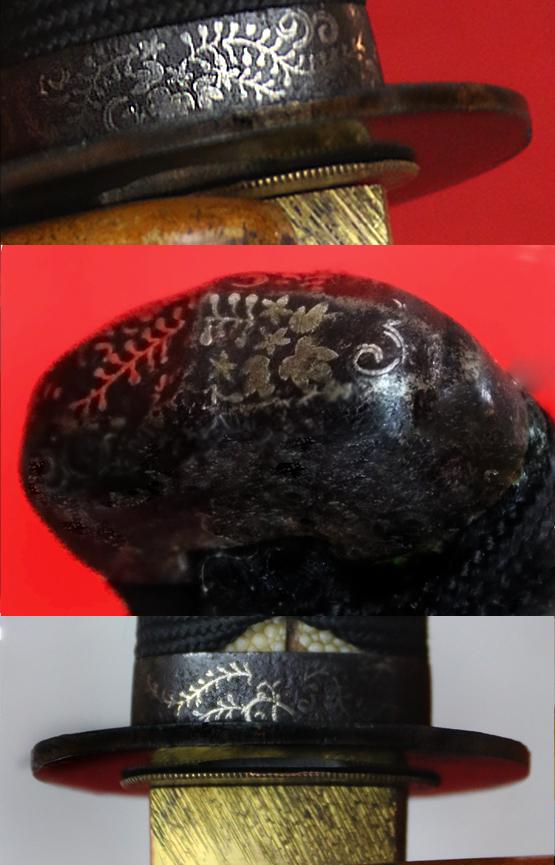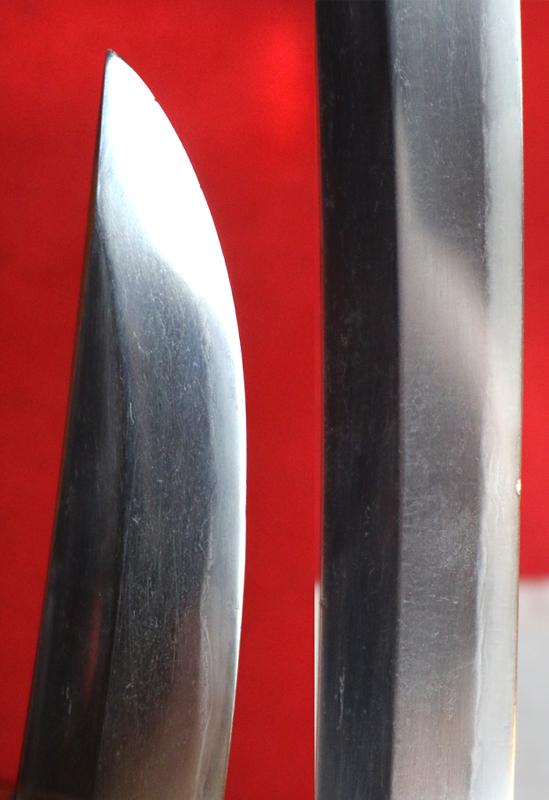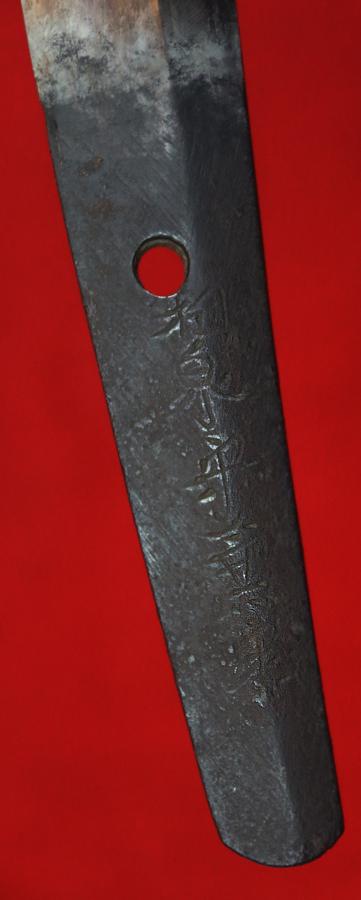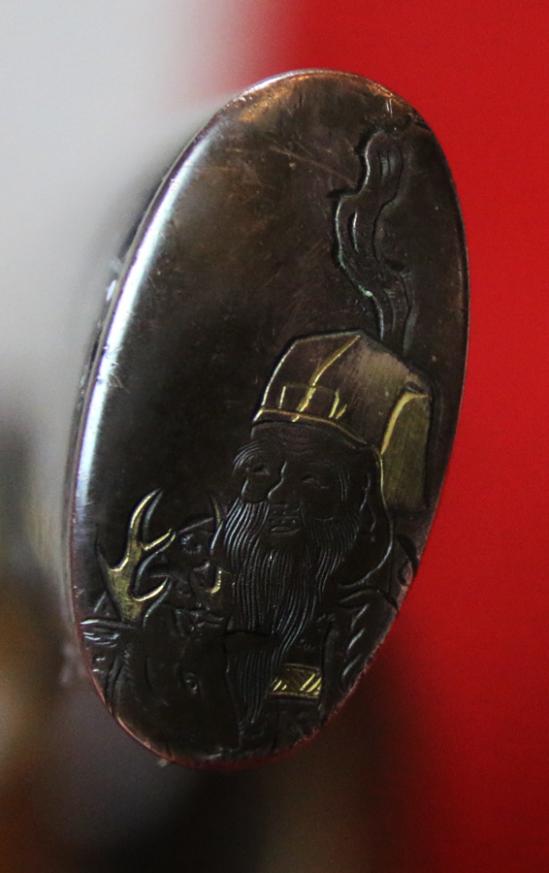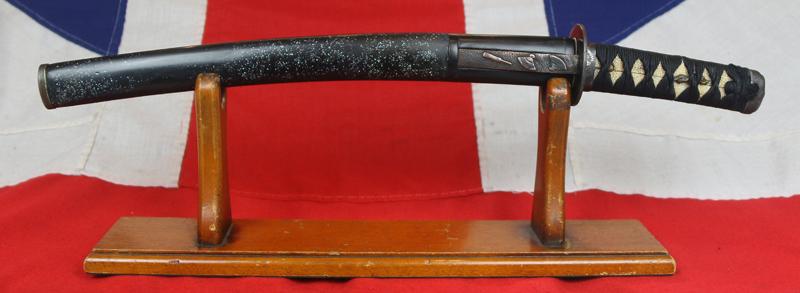A Most Impressive and Beautiful Wakizashi Circa 1580 with Representations of the Two of the Japanese Seven Lucky Gods
Signed Izumi kami Kanesada original edo period fittings and saya. The saya has a light application of crushed abilone shell and pockets for the kodzuka and kogai. The fushigashira are iron inlaid with tendrils in gold and silver, with dragon menuki in patinated copper, a circular tsuba with kodzuka ana and kogai ana. the kodzuka has decor of takebori war fans, two open and one closed. the blade is signed. The kogai has has a takebori sinchu scroll and staff of Jurojin, and the blade is superb with a nice suguha hamon and a gold covered habaki with engraved raindrop pattern. The saya has a pair of very fine quality matching fittings, both gold and shakudo, a kurigata engraved with Hotei and the sayajiri, with engraved Jurojin. In Japan, Hotei and Jurojin are two of the Seven Gods of Fortune or Shichifukujin, according to Taoist beliefs.Jurojin is the god of longevity. Jurojin originated from the Chinese Taoist god, the Old Man of the South Pole. He is known as the immortal of the Northern Song dynasty (960–1127), and may have been a historical figure of the period. Jurojin is identified as the personification of the Southern Polar Star. While paintings and statues of Jurojin are considered auspicious, he never developed a following independent of the other deities Seven Gods of Fortune.
Jurojin is often identified with Fukurokuju, another of the Several Gods of Fortune. In some accounts, the two are said to inhabit the same body. As such, the two are often confused.
Jurojin walks with a staff and a fan. He is depicted as an old man of slight stature, and by tradition, less than 3 shaku (approximately 90 centimetres (35 in) He is depicted with a long white beard and often a very tall, bald head. He has a scroll tied to his staff, on which is written the lifespan of all living things. The scroll is sometimes identified as a Buddhist sutra. The deer, a symbol of longevity, usually (but not always) accompanies him as a messenger, as do other long-lived animals such as the crane and the tortoise. Hotei is the god of fortune, guardian of children, patron of diviners and barmen, and also the god of popularity. He is depicted as a fat, smiling, bald man with a curly moustache. He always appears half-naked, as his clothes are not wide enough to cover his enormous belly. He blessed the Chinese, and they nicknamed him "Cho-Tei-Shi" or "Ho-Tei-Shi", which means ‘bag of old clothes’.
Hotei was a Zen priest, but his appearance and some of his actions were against their moral code: his appearance made him look like quite a mischievous person and he had no fixed place to sleep.
He carries a bag on his shoulders which is loaded with fortunes for those who believe in his virtues. Hotei's traits and virtue are contentment, magnanimous and happiness.
Hotei's original Chinese name was Kaishi, and according to legend, he died in March 916.
The Japanese began to believe in Hotei during the Edo era. The reason why the Japanese have such great respect for this god comes from a legend that says that, before the Zen Buddhism arrived to Japan, an alternative Buddhist thought was extended by a priest of dubious aesthetic, who actually was a manifestation of Miroku. Miroku was the patron of those who could not be saved by the beliefs of Buddha, and Hotei was later perceived and accepted by the Japanese as a second Miroku.A Good Edo Period Noda Maru Gata Oval Iron Wakazashi Tsuba
With a simulated stone finish surface. The Tsuba can be solid, semi pierced of fully pierced, with an overall perforated design, but it always a central opening which narrows at its peak for the blade to fit within. It often can have openings for the kozuka and kogai to pass through, and these openings can also often be filled with metal to seal them closed. For the Samurai, it also functioned as an article of distinction, as his sole personal ornament. Tsuba are usually finely decorated, and are highly desirable collectors' items in their own right. Tsuba were made by whole dynasties of craftsmen whose only craft was making tsuba.
Code: 23932
5500.00 GBP


